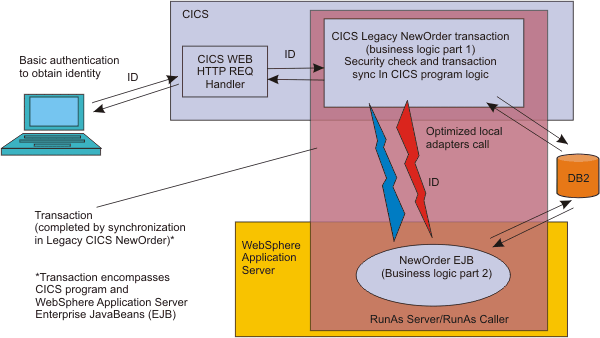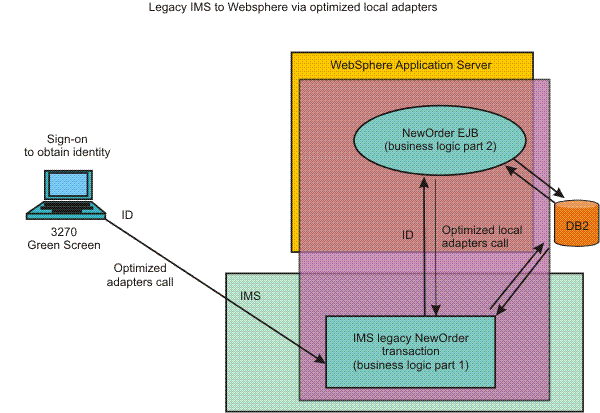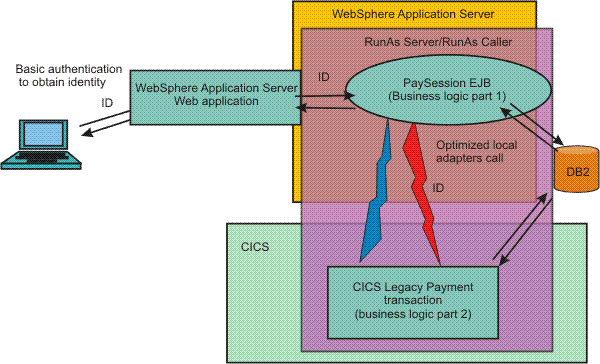Plan to use optimized local adapters for z/OS
Use this high-level task when we are planning to implement the optimized local adapters for z/OS in our environment.
For CICS Transaction Server for z/OS to communicate with optimized local adapters, the minimum required version of CICS Transaction Server for z/OS is version 3.1. To use two-phase commit or resource manager local transactions (RMLT) support for outbound calls from WebSphere Application Server to CICS, use CICS Transaction Server for z/OS Version 4.1.
Optimized local adapters and the supporting native API callable services provide a different path for enterprise architecture and application development on the z/OS platform. Optimized local adapters can be used to make inbound calls from an external address space to EJB applications that are deployed on a local WebSphere Application Server for z/OS server, and make outbound calls from an application running under WebSphere Application Server for z/OS to a server program running in an external address space.
- Review existing applications to determine which processes would benefit from using optimized local adapters. Using optimized local adapters
provides applications that are written in native languages like Cobol, PL/I, C/C+, and high-level assembler, and are running under environments such as z/OS batch, Customer Information Control System (CICS) and UNIX System Services (USS), a different way to call Java applications that are implemented as EJB applications on WebSphere Application Server for z/OS.
We can read about several different types of scenarios where optimized local adapters are used with existing business and middleware applications in the topic, Optimized local adapters for z/OS usage scenarios.
- Make sure that you are running WebSphere Application Server in 64-bit mode. When creating an application server, it is automatically configured to run in 64-bit mode. If we find that the application server is configured to run in 31-bit mode, we can convert the application server to run in 64-bit mode. To learn how to do this conversion, see the topic, Running servers in 31-bit mode, and the section "Converting
a migrated server to run in 64-bit mode".
- Make sure that WebSphere Application Server is using a SAF-based
user registry if you plan to propagate a SAF user ID from WebSphere Application Server for z/OS to the enterprise information system (EIS).
Optimized local adapters can be used to connect with CICS and Information Management Systems (IMS™), over OTMA support.
- Review the optimized local adapters samples. There are several examples that are included when you install WebSphere Application Server for z/OS. See the topic Optimized local adapters Samples on how to locate and use the samples.
- Decide how to use optimized local adapters. We can use the optimized local adapters to make inbound or outbound calls.
- Use the optimized local adapters for inbound support.
We can use the optimized local adapters support to call inbound to WebSphere Application Server for z/OS EJB applications. The following image shows the flow of an inbound CICS call to a WAS EJB application.
Figure 1. Using CICS

Figure 2. Using IMS

- Use the optimized local adapters for outbound support.
We can use the optimized local adapters support to call programs in external address spaces from WebSphere Application Server for z/OS applications.
The following illustration shows the flow of an outbound WebSphere Application Server call to a CICS transaction.

The following illustration shows the flow of an outbound WebSphere Application Server call to a IMS transaction.

- Use the optimized local adapters for inbound support.
Subtopics
- (zos) Optimized local adapters on WebSphere Application Server for z/OS
Optimized local adapters support on WebSphere Application Serverfor z/OS consists of a set of callable services and a Java EE Connector Architecture (JCA) 1.5 resource adapter. The services and adapter work together to provide high performance calling between native language applications on z/OS and business logic in a WAS for z/OS environment. - (zos) Optimized local adapter Samples
- (zos) Optimized local adapters for z/OS usage scenarios
Optimized local adapters and the supporting native API callable services provide an alternative path for enterprise architecture and application development on the z/OS platform. - (zos) Optimized local adapters performance considerations
When using the WAS for z/OS optimized local adapters APIs, there are several areas that need to be considered regarding performance. - (zos) Optimized local adapter Samples
Related concepts
Related tasks